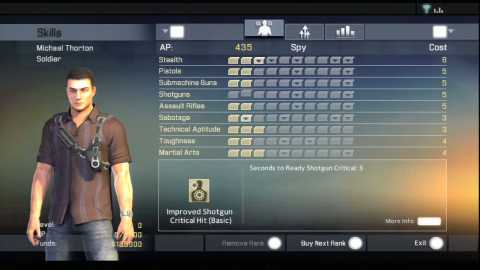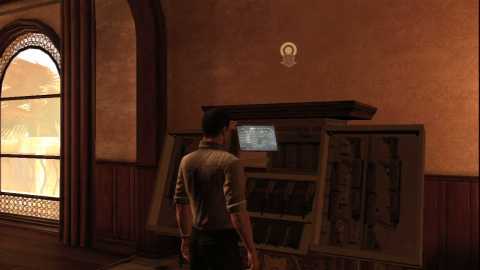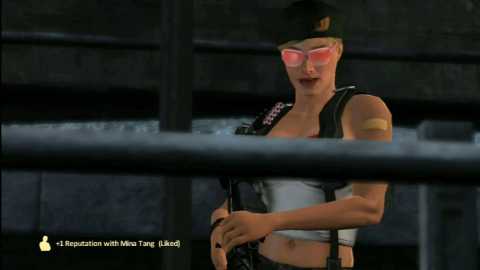
The game puts you in the role of Michael Thorton. He's the new guy at an ultra-secret, above-the-law spy organization called Alpha Protocol. The game opens with Michael getting ready for his first assignment, which sends him to Saudi Arabia on the trail of some terrorists who have come into possession of some American-made missiles, which they promptly use to shoot down a civilian airliner. But as you get closer to the truth behind these missiles, your new buddies back at home base decide you're something of a liability. This puts you in place to unravel a conspiracy involving the defense contractor--known as Halbech--that built those missiles in the first place, along with voting machines, Middle East construction projects, and just about any other recent hot-button item that can make the corporation seem shadier than Haliburton and Blackwater combined.
While the facts of the adventure remain mostly the same, how you handle your relationships with others has a big impact on how it all plays out. As you play, you'll be put into several situations where you can decide who lives and who dies. Even after most boss fights, which see you filling your opponent full of lead, you're given a chance to spare their lives. This lets you form alliances or rivalries with a number of different factions, from terrorist organizations to Asian gangs to the Chinese secret police. This gives you an opportunity for noticeable benefits, like allies that will join you in some of the more gun-heavy missions or the ability to purchase additional weapons and upgrades. But the way the game interprets your actions and feeds them back to you goes deeper than merely letting people live or die.

You'll also do a lot of talking in Alpha Protocol. The game has Mass Effect-like dialogue trees with a couple of key differences. First, the game doesn't really spell out exactly what your dialogue options are. Rather than reading lines of text before picking what you want to say, you press different buttons to control the attitude of your response. You can respond professionally, aggressively, or smoothly, most of the time. The different characters you meet like to be treated differently, so you can go "suave" with Mina, one of your mission handlers, to flirt with her. Meanwhile, no-nonsense guys like Alan Parker, one of the other Alpha Protocol analysts, prefer a professional approach. The other big change is that the game doesn't let you take forever to make up your mind. The dialogue choices and a timer bar appear while the other character is still talking, so you don't have much time to decide. This forces you to think on your feet and stay engaged during cutscenes. It's pretty cool. You'll learn more about the various players in the universe by talking to them or about them with others. In fact, some missions contain no combat at all, focusing entirely on dialogue. This goes a long way toward making Alpha Protocol feel like more than just a third-person shooter with some stealth mechanics.
It's a good thing that the dialogue and alternate paths in Alpha Protocol can be so interesting, because the action is really deflating. Granted, Alpha Protocol focuses more on its RPG aspects than its shooting, but firing a weapon is still extremely unsatisfying. At the beginning of the game, before you've put upgrade points into any of the four weapon categories, Thorton fires a weapon as if he's never even seen a gun before and is saddled with poor cover mechanics, as well. Your shots are wildly inaccurate and mostly ineffective. As a direct result, I ended up funneling most of my upgrade points, which are earned by leveling up, into stealth. Stealth in Alpha Protocol is a little silly, as you'll earn abilities that essentially make you invisible. Running around in slow-motion for 20 seconds, performing silent takedowns on enemies as their friends watch, only to have those friends be completely unable to detect you is squarely at odds with the rest of the game's reasonably realistic presentation. But once you get past that, slinking around and choking guys out is at least more satisfying than the subpar gunplay.

There's some good writing in Alpha Protocol and the voice cast is mostly able to back that up. Since you can play the game with a few different attitudes, the actor handling the main character has to play some lines with different tones. His "professional" and "suave" tones work a lot better than his aggressive tone, which sounds a little forced and less believable than the rest. Also, it must be said that Alpha Protocol contains Nolan North, who turns in a great, non-Drake-like performance.
If you decide to play Alpha Protocol, just know that your main enemies over the course of its 15-or-so hours will be its collection of misery-inducing technical issues and the clash between its action and role-playing elements. There are parts of Alpha Protocol that I feel are totally amazing and absolutely worth seeing, but you'll have to trudge through a lot of very disappointing stuff just to see it.